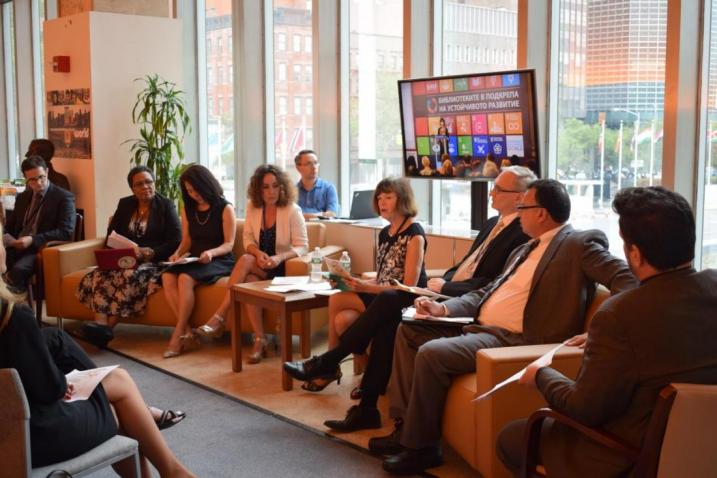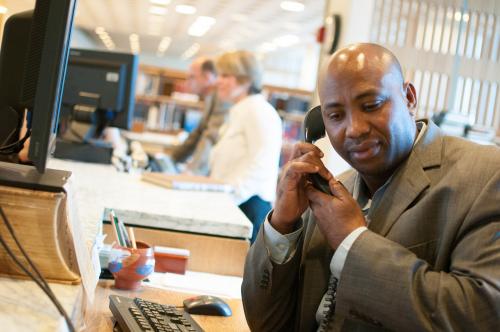Can libraries play a role in jump-starting and ensuring success for sustainable development initiatives and projects? Can they support individual citizens, community institutions, and businesses improve livelihoods and quality of life? Can they be partners with government in implementing the UN 2030 Agenda?
Those were the questions explored at a fireside chat jointly organized by the UN Dag Hammarskjöld Library (DHL) and the International Federation of Library Associations and Institutions (IFLA) during the High-Level Political Forum on Sustainable Development. The event brought together leaders from the library profession, UN development experts, and researchers from the Technology and Social Change Group (TASCHA) of the University of Washington, and set the stage leading up to the release of a new IFLA-commissioned report on development and access to information (DA2I).
Welcoming attendees to DHL’s iconic signature reading room, the new UN Library chief Thanos Giannakopoulos recognized IFLA’s critical role in advocating for the inclusion of access of information as a cross-cutting issue that can, if supported by relevant government policies, advance the implementation of the UN 2030 Agenda.
In her inspirational lead intervention, IFLA President Donna Scheeder boldly stated that, based on the evidence presented in the DA2I report, there is no truly sustainable development without access to information, and no meaningful, inclusive access to information without libraries. She warned that without strong government support for libraries, the digital divide could turn into an information and knowledge divide.
Maria Garrido, senior researcher of the TASCHA team that elaborated the DA2I report, explained that the report took both a rights-based and an evidence-based approach to development. She highlighted how various dimensions of civil, political, economic and cultural rights impacted access to information and she called for the collection of more and better data to build evidence for the strong linkages between access to information and inclusive societies where no one is left behind.
Next, Helena Asamoah-Hassan, Executive Director of the African Library and Information Associations and Institutions (AfLIA), brought the concepts and ideas to the ground by presenting cases of how public and academic libraries in Ghana were improving access to information and driving progress towards achieving the SDGs, in particular quality education and gender equality.
Three development experts from the UN’s Department of Economic and Social Affairs, Ms. Wenyan Yang, Mr. Sami Areikat and Mr. Richard Alexander Roehrl, shared their perspectives on the issue, beginning with the critical role that libraries played in their education. Ms. Yang and Mr. Areikat stressed that access to current, high-quality research in the development field and the services that the UN Library provided in that regard were critical to their work in the areas of national capacity building (water resources development and sanitation) and encouraging UN Member States towards adopting strong social protection policies (e.g. old age pensions). Mr. Roehrl highlighted the need for an open information infrastructure to facilitate the collection and dissemination of policy research papers related to the Global Sustainable Development Report, in particular those produced by researchers from developing countries that included unique perspectives often not found elsewhere.
Another vital aspect of the work of libraries surfaced during the lively discussion that concluded the event: teaching both digital and media literacy skills that have become essential for citizens to navigate a media environment polluted by alternative facts. A related infographic produced by IFLA and translated into over 30 languages has gone viral and is being used by librarians everywhere to teach strategies on how to spot fake news.
Can libraries support the UN’s work on sustainable development and contribute to making the 2030 Agenda a reality? The participants responded with a resounding Yes, they can!


